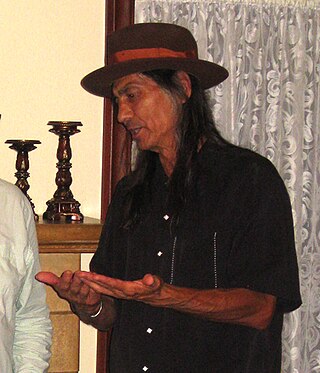Top Qs
Timeline
Chat
Perspective
Richard Ray Whitman
Yuchi-Muscogee multidisciplinary visual artist, poet and actor From Wikipedia, the free encyclopedia
Remove ads
Richard Ray Whitman (born 1949) is a Yuchi-Muscogee multidisciplinary visual artist, poet, and actor. He is enrolled in the Muscogee Nation and lives in Oklahoma.[1][2]
Remove ads
Early life and education
Whitman was born in Claremore, Oklahoma, in 1949.[3] His maternal grandmother was Polly Long.[1] Like many Yuchis, Whitman is enrolled in the Muscogee Nation.[4] He grew up in Gypsy, Oklahoma, and attended Bristow High School. He also attended the Institute of American Indian Arts, the California Institute of the Arts, and the Oklahoma School of Photography in Oklahoma City.[1]
Career
Summarize
Perspective
Whitman began his art career as a painter and expanded to photography, installation, and video art.[4] In 1973, he participated in the 71-day occupation of Wounded Knee and created art during the occupation.
Photography
Whitman is known for his black-and-white photography portraying contemporary Native realities, especially his "Street Chiefs Series" from the 1970s and 1980s. "Street Chiefs" features images of homeless Native men, primarily in downtown Oklahoma City. "The contemporary Indian in the isolation of the city canyons and rural reservations is avoided. The boredom, pain, frustration, poverty of the reality-counterbalance of our lives is harsh, unattractive, and unmarketable."[2] His photographic portraits are compassionate and empathetic to the lives of homeless natives and places them in the larger context of Indian Removal, which forced tribes from all over the country to Indian Territory.[4]
From the 1980s onward, Whitman has incorporated text and computer graphics in his photography to create collage or mixed media. His socio-politically informed work often deals with the issues of homeland and dispossession.[4]
Videography and acting career
Collaborating with Yuchi poet and brother Joe Dale Tate Nevaquaya, Whitman created video to document the Yuchi language. Together they worked with French filmmaker Pierre Lobstein in the 1990s. Whitman read T.C. Cannon's poetry in the video "Mazerunner: The Life and Art of T.C. Cannon" which was directed and edited by Phillip Albert. This work was subsequently screened at the Metropolitan Museum of Art (3/19/1994) and was presented on the Bravo Cable Channel and the Independent Film Channel from May, 1995 through June, 1996.
Remove ads
Filmography
Film
Television
See also
References
Further reading
External links
Wikiwand - on
Seamless Wikipedia browsing. On steroids.
Remove ads

